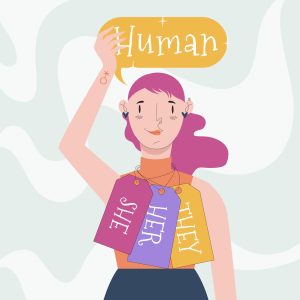American Library Association Recognizes Books for Their Portrayal of the Disability Experience
The American Library Association (ALA) announced the winners of the 2023 Schneider Family Book Awards.
The American Library Association (ALA) announced the winners of the 2023 Schneider Family Book Awards.
 Issues of equality and acceptance of transgender and nonbinary people — along with challenges to their rights — have become a major topic in the headlines. These issues can involve words and ideas and identities that are new to some.
Issues of equality and acceptance of transgender and nonbinary people — along with challenges to their rights — have become a major topic in the headlines. These issues can involve words and ideas and identities that are new to some.
NPR has put together a glossary of terms relating to gender identity to help people communicate accurately and respectfully with one another. Read more ›
 If you need special supports or accommodations to succeed while you are in high school, the Individuals with Disabilities Education Act (IDEA) requires that a well thought-out Individualized Education Program (IEP) be developed and updated yearly.
If you need special supports or accommodations to succeed while you are in high school, the Individuals with Disabilities Education Act (IDEA) requires that a well thought-out Individualized Education Program (IEP) be developed and updated yearly.
Once you graduate from high school and begin postsecondary education, you will no longer have an IEP and the IDEA will no longer apply. The laws and types of support you can get will be different. Read more ›
 The National Center for College Students with Disabilities (NCCSD) is a federally-funded, national resource for future and current college students and graduate students with any type of disability, chronic health condition, or mental or emotional illness. Read more ›
The National Center for College Students with Disabilities (NCCSD) is a federally-funded, national resource for future and current college students and graduate students with any type of disability, chronic health condition, or mental or emotional illness. Read more ›

Nearly every college and university in the US has an office on campus that works with students who have disabilities. The office is responsible for making sure that campus classes, programs, buildings and other facilities, and services are accessible to students with disabilities. Read more ›
 Researchers have long known poor mental health negatively affects academic achievement, and the COVID-19 pandemic has put a spotlight on how schools can help address the issue. Read more ›
Researchers have long known poor mental health negatively affects academic achievement, and the COVID-19 pandemic has put a spotlight on how schools can help address the issue. Read more ›
 When we teach kids early on that it’s OK to talk about race, we help them to understand, respect, and appreciate the differences between people. This builds empathy and compassion for others so that kids are better able to see when things in their world seem unjust or unfair — and can do something about it. Read more ›
When we teach kids early on that it’s OK to talk about race, we help them to understand, respect, and appreciate the differences between people. This builds empathy and compassion for others so that kids are better able to see when things in their world seem unjust or unfair — and can do something about it. Read more ›
 Infants as young as six months old can recognize differences in skin color. By age two and a half, research has shown, children prefer playmates who are similar in race and gender. And as early as age three, they are forming judgments about people based on racial differences.
Infants as young as six months old can recognize differences in skin color. By age two and a half, research has shown, children prefer playmates who are similar in race and gender. And as early as age three, they are forming judgments about people based on racial differences.
What children learn, hear, and witness from family members, friends, and others in their communities about race plays a major role in how they view people who are different from them, according to Yale experts. Read more ›

 Navigating learning and mental health challenges is difficult; adding racial and ethnic diversity to the mix can magnify the inequities and complexities of the journey. Read more ›
Navigating learning and mental health challenges is difficult; adding racial and ethnic diversity to the mix can magnify the inequities and complexities of the journey. Read more ›
 When I was a special education teacher, my colleagues and I recommended that a Black girl receive special education services because she had difficulty reading. However, her mother disagreed. When I asked her why, she explained that she, too, was identified as having a learning disability when she was a student. Read more ›
When I was a special education teacher, my colleagues and I recommended that a Black girl receive special education services because she had difficulty reading. However, her mother disagreed. When I asked her why, she explained that she, too, was identified as having a learning disability when she was a student. Read more ›